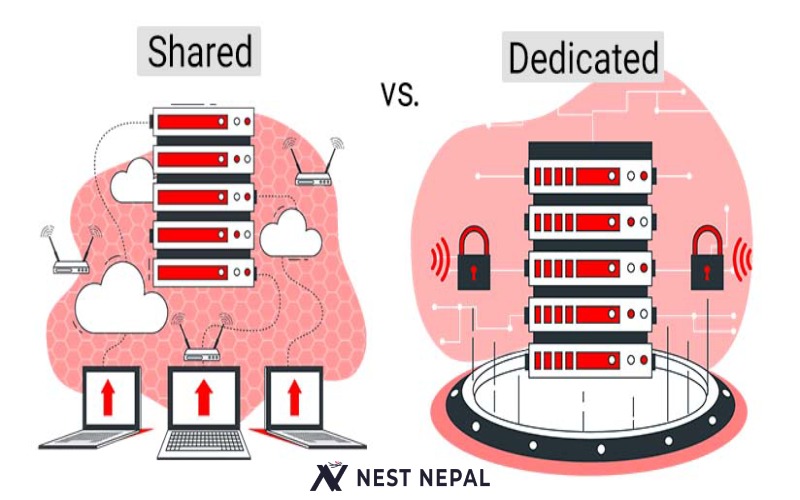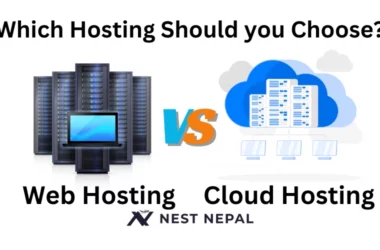This guide aims to simplify matters by focusing on two contrasting web hosting setups: shared hosting and dedicated hosting. In the world of web hosting services, the array of options available might seem overwhelming, leaving you unsure of where to begin.
By the end of this resource, you’ll gain a clearer insight into the offerings of each web hosting option, empowering you to make an informed decision on where and how to host your website.
Shared Hosting vs Dedicated Hosting
Both shared hosting and dedicated hosting involve storing your website data on a single server. When users access your website via their browsers, this server delivers your content to them. The distinguishing factor between these hosting types lies in the server setup.
Shared hosting accommodates multiple websites on a single server, with users sharing resources. Conversely, dedicated hosting allocates a server exclusively to your website. Each option presents its own array of benefits and drawbacks. Explore into the contrast between shared hosting and dedicated hosting to determine the most suitable option for your business.
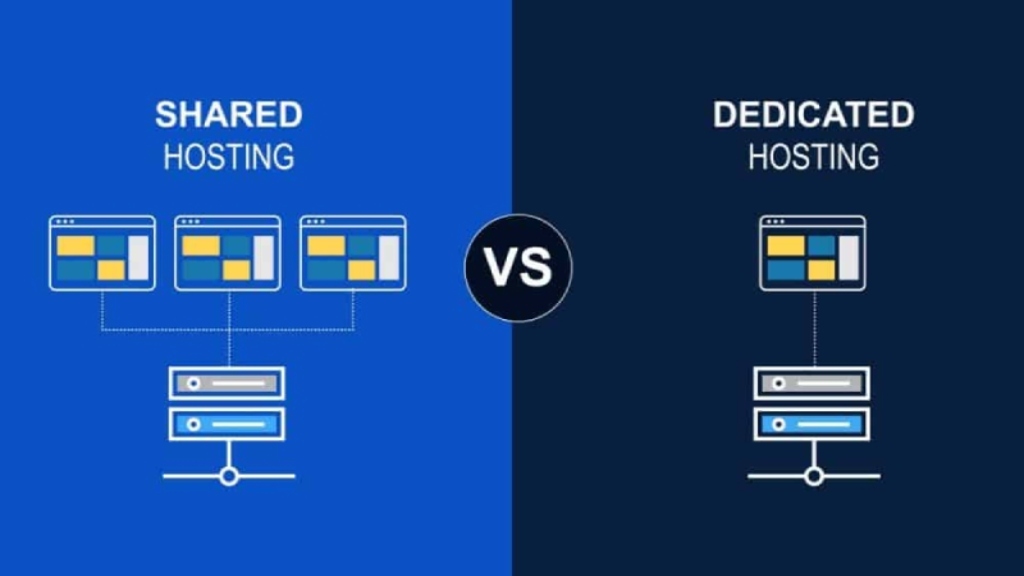
What is Shared Hosting?
Shared hosting is a web hosting service where multiple websites share resources on a single server. It’s cost-effective and managed by the hosting provider, making it ideal for individuals and small businesses with modest website needs. Shared hosting requires hosting numerous websites on one server, similar to a public bus system where resources are shared among users. This arrangement offers certain benefits and drawbacks.
Pros of Shared Hosting:
Affordability: Shared hosting is incredibly cost-effective, making it an ideal choice for individuals and small businesses with limited budgets. Since the server’s resources are divided among multiple users, the overall cost is significantly lower compared to dedicated hosting.
Ease of Use: Shared hosting providers typically offer user-friendly control panels, such as cPanel or Plesk, simplifying website management tasks like setting up email accounts, installing applications, and managing files. This accessibility makes shared hosting an attractive option for beginners and non-technical users.
Cons of Shared Hosting:
Limited Resources: One of the main drawbacks of shared hosting is its limited resources. Since multiple websites share the same server, performance can be affected during peak traffic periods or if other websites on the same server experience high usage. This may result in slower loading times and decreased responsiveness for your website.
Less Customization: Shared hosting environments often come with limitations on customization options and configurations compared to dedicated hosting. Users may be restricted in terms of installing certain software or implementing advanced features, which can be a drawback for those with specific technical requirements.
Security Concerns: While shared hosting providers implement security measures to protect their servers, the actions of other users sharing the same server can potentially compromise the security of your website. Vulnerabilities in one website can expose other websites to security threats, making shared hosting less secure compared to dedicated hosting.
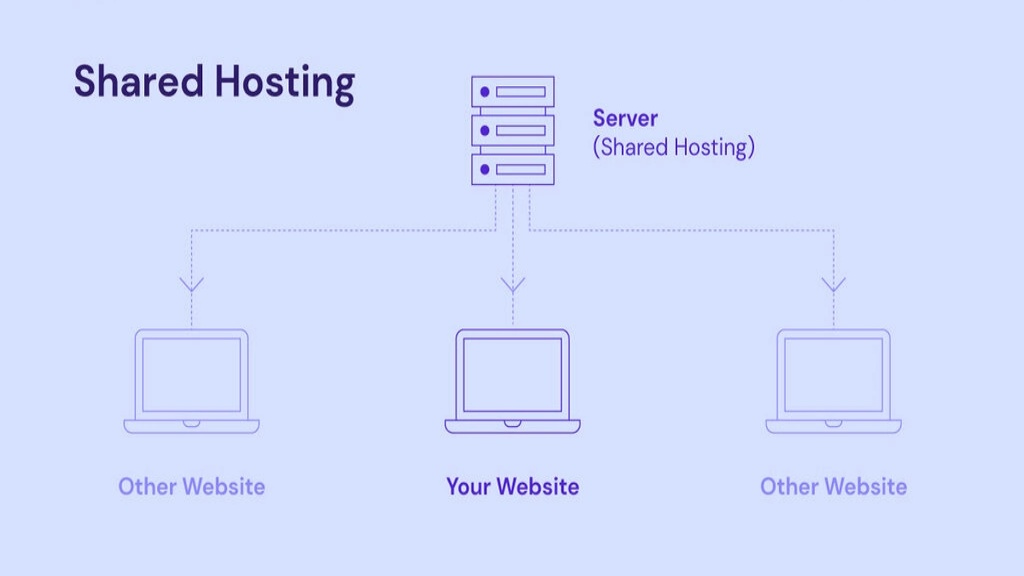
Who uses Shared Hosting?
Shared hosting is ideal for website owners seeking an accessible and budget-friendly option. It serves well to personal projects, small businesses, and even medium-sized enterprises. The drawbacks of shared hosting are negligible as long as website traffic remains moderate and the server is safeguarded by dependable security measures.
When websites surpass the resources available in shared hosting arrangements, there are alternative hosting plans available for transition. The process of migrating a website from one hosting environment to another is straightforward and does not compromise the efficiency of your site.
What is Dedicated Hosting?
Dedicated hosting is a type of web hosting service where a single server is exclusively leased to one user or organization. It provides full control over server resources, offering enhanced performance, customization options, and security. Dedicated hosting is typically used by large businesses or websites with high traffic and specific technical requirements. Let’s explore the pros and cons of dedicated hosting:
Pros of Dedicated Hosting:
Performance: With dedicated resources allocated solely to your website, you can expect consistent performance even during peak traffic periods. This ensures faster loading times, enhanced user experience, and better search engine rankings. Dedicated hosting is particularly well-suited for high-traffic websites, large enterprises, and applications that demand robust resources and performance.
Customization: Dedicated hosting grants full control over server configurations, allowing users to customize hardware, software, security settings, and other parameters according to their specific requirements. This level of customization empowers businesses to personalize their hosting environment to meet the unique needs of their website or application.
Scalability: Dedicated servers offer scalability, enabling businesses to seamlessly scale resources up or down based on evolving needs. Whether you’re experiencing rapid growth or need to accommodate seasonal fluctuations in traffic, dedicated hosting provides the flexibility to adjust resources accordingly, ensuring optimal performance and cost-efficiency.
Cons of Dedicated Hosting:
Cost: Despite its many advantages, dedicated hosting comes with a higher price tag compared to shared hosting. The exclusive use of server resources results in higher hosting costs, making dedicated hosting less accessible to individuals and small businesses with limited budgets. However, for organizations that require robust performance, customization, and security, the investment in dedicated hosting can be justified.
Technical Expertise: Managing a dedicated server requires technical expertise or the assistance of a dedicated hosting provider. Tasks such as server maintenance, security updates, and troubleshooting demand a certain level of proficiency. While dedicated hosting offers greater control and flexibility, it also requires a higher level of technical proficiency to effectively manage and maintain the server environment.
Who uses Dedicated Hosting?
Dedicated hosting is most suitable for enterprises with high bandwidth demands and unique specifications. For instance, large corporations that have significant data assets would prioritize the higher security measures offered by dedicated hosting. Additionally, it offers optimal advantages to individuals proficient in technology who can leverage its customization capabilities to their advantage.

Choosing the Right Option:
When it comes to choosing between shared hosting and dedicated hosting, there are several factors to consider:
Budget:
Evaluate your budgetary constraints and determine the hosting option that aligns with your financial resources. Shared hosting is more affordable, making it suitable for individuals and small businesses with limited budgets. Dedicated hosting, while more expensive, offers greater performance, customization, and security for organizations with higher hosting budgets.
Traffic and Performance Requirements:
Consider the expected traffic volume and performance requirements of your website. If you anticipate high traffic or require consistent performance, dedicated hosting may be the better choice. Dedicated hosting ensures that your website has access to dedicated resources, providing optimal performance and reliability even during peak traffic periods.
Technical Expertise:
Assess your technical proficiency and resources available for managing server-related tasks. Shared hosting is more user-friendly and requires minimal technical expertise, making it suitable for beginners and non-technical users.
Dedicated hosting, on the other hand, requires a higher level of technical proficiency to effectively manage and maintain the server environment. If you lack the necessary technical expertise, you may need to enlist the help of a dedicated hosting provider or IT professional.
Scalability and Growth:
Consider the scalability and growth potential of your website. Shared hosting may be sufficient for small websites with low to moderate traffic, but it may not be suitable for high-traffic websites or applications with intensive resource requirements. Dedicated hosting offers greater scalability and flexibility, allowing businesses to easily scale resources up or down as needed to accommodate growth and changing demands.
Best Web Hosting Provider – Nest Nepal
Considering the Middle Ground: VPS Hosting
VPS (Virtual Private Server) hosting offers a middle ground between shared and dedicated hosting. Virtual Private Server hosting is a type of web hosting where a physical server is divided into multiple virtual servers.
Each virtual server acts like a dedicated server, with its own operating system, resources, and configurations. VPS hosting provides more control, scalability, flexibility, security, reliability, and performance compared to shared hosting, but is more affordable than dedicated hosting.
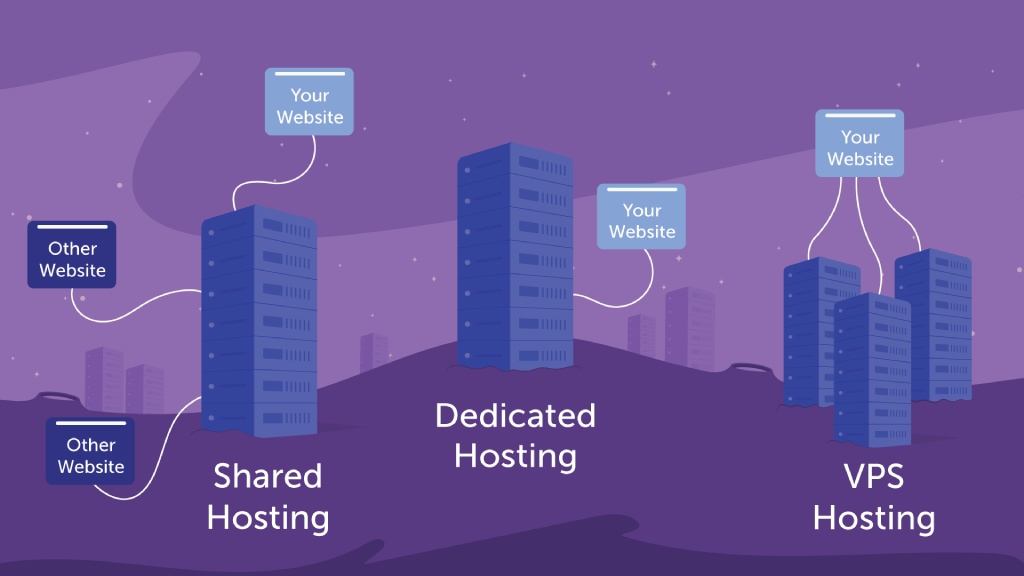 Shared vs Dedicated vs VPS hosting
Shared vs Dedicated vs VPS hosting
Conclusion:
In conclusion, shared hosting and dedicated hosting each offer distinct advantages and cater to different hosting needs. When choosing between shared hosting and dedicated hosting, it’s essential to carefully consider your budget, traffic and performance requirements, technical expertise, and growth potential.
By evaluating these factors and understanding the differences between shared hosting and dedicated hosting, you can make an informed decision that aligns with your website’s needs and goals. Whether you’re launching a personal blog, a small business website, or a large-scale e-commerce platform, choosing the right hosting option is crucial for the success of your online presence.
Learn more: Best International VPS hosting for your website




